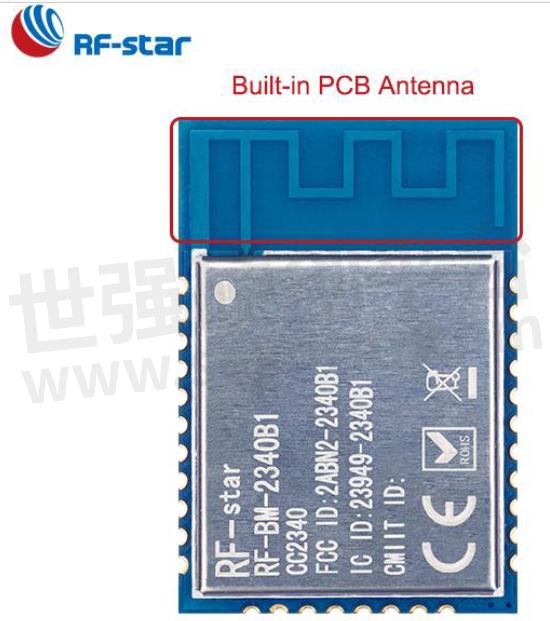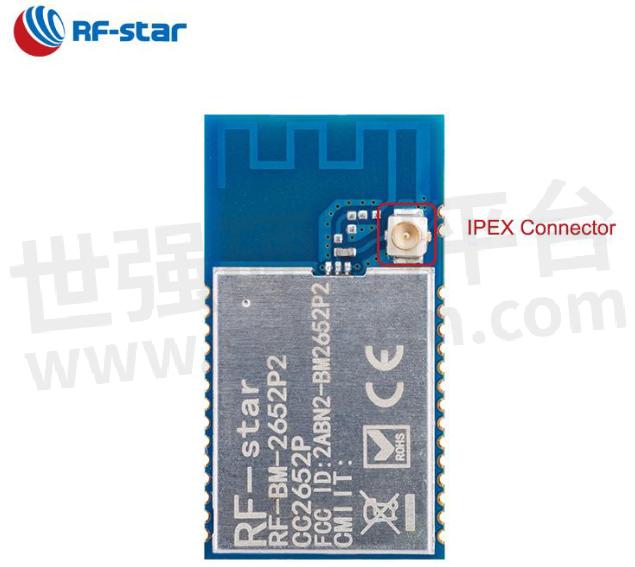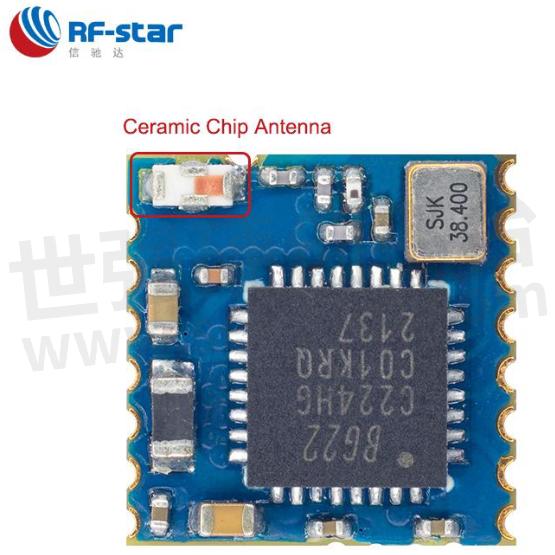Common RF Antennas of Bluetooth Modules: The Ultimate Guide




In the era of wireless connectivity, Bluetooth technology stands as a beacon of innovation, facilitating effortless communication between devices. At the heart of this wireless marvel lies a critical component – the RF Antenna. Discover the intricate world of RF antennas within Bluetooth Modules through this comprehensive
guide, exploring their types and gaining insights into the pros and cons of each.
Whether you're a tech enthusiast or a seasoned professional, understanding the nuances of Bluetooth antennas is crucial for optimizing wireless performance. Click, read, and share this ultimate guide to empower your connectivity journey!
What Is An RF Antenna?
RF, or radio frequency antennas are the unsung heroes of wireless communication, enabling the transmission and reception of radio waves. In the realm of Bluetooth modules, RF antennas play a pivotal role in ensuring stable and reliable wireless communication between devices.
Common RF Antenna Types of Bluetooth Modules
Bluetooth modules come equipped with various RF antenna types, each designed to cater to specific applications and requirements. Let's explore the common Bluetooth antenna types in detail. Furthermore, understanding the advantages and disadvantages of each antenna helps you make informed decisions during the design and implementation phases.
1. PCB Antenna: Unlocking the Power of Integration
A PCB antenna, as the name suggests, is an antenna that utilizes the conductive traces and components directly onto the printed circuit board. These traces can take various shapes like straight lines, inverted F-shapes, serpentine patterns, or even circular designs. With a length equivalent to a quarter-wavelength, the traces effectively function as antennas, radiating electrical signals or capturing incoming signals.

Figure 1 RF-star CC2340R5 Module RF-BM-2340B1 Integrated with Inverted-F Antenna
While offering advantages in terms of space efficiency and cost savings, it comes with certain trade-offs.
PCB Antenna: Space Efficiency vs. Limited Range
Cost-Effective Integration: The integration of the antenna directly onto the PCB reduces the need for additional components, resulting in cost savings during manufacturing.
Space Efficiency: PCB antennas optimize space utilization, making them suitable for devices with limited real estate.
Streamlined Aesthetics: The absence of external antennas contributes to a cleaner and more aesthetically pleasing design, which is crucial for consumer-oriented products.
Customizable Designs: PCB traces can be customized into various patterns, providing flexibility in designing antennas tailored to specific performance requirements.
Signal Range Limitations: PCB antennas may have limitations in signal range compared to external antennas. This trade-off should be considered based on the application's requirements.
Potential Interference: Proximity to other components on the PCB can lead to interference and affect the antenna’s performance. Proper design considerations are crucial to mitigate this issue.
Single-Frequency Constraint: PCB antennas are tailored for single-frequency applications such as Bluetooth or WiFi, and their effectiveness may diminish beyond these designated ranges. Exploring alternative antenna solutions could prove more advantageous when wideband or multi-band coverage is essential.
PCB antennas find their sweet spot in applications that prioritize space-saving, cost-effectiveness, and simplified assembly. They are particularly well-suited for wireless modules operating in the 2.4 GHz frequency band, including WiFi modules, Bluetooth modules, and ZigBee modules.
2. IPEX Connector: Harnessing Flexibility and Range
IPEX connector is specifically designed as a micro coaxial connector that excels in connecting external antennas to small electronic devices, such as wireless modules, WiFi modules, and Bluetooth modules. Its external configuration can take various forms, offering versatility. The IPEX interface, typically a small metal socket with compact metal pins, serves as a matching interface for connecting external antennas.

Figure 2 RF-star CC2652P Module RF-BM-2652P2I with IPEX Connector
It's important to emphasize that the IPEX connector is not standardized; it has different types like MHF1, MHF2, MHF3, and more Hence, when acquiring external antennas or adapters, it's crucial to to carefully choose the accurate IPEX connector to ensure compatibility and establish a reliable connection.
IPEX External Antenna: Range Mastery vs. High Cost
Excellent Directional Signal: IPEX external antennas precisely orient signals, enhancing communication accuracy for extended coverage applications
Customization: Detachable and replaceable, providing flexibility for specific applications.
Interference Resilience: External configuration minimizes interference from internal components, ensuring a stable connection even in challenging environments.
Debugging Simplicity: The effortless connectivity achieved through minimal tuning and matching requirements, streamlining the integration process for manufacturers.
Higher Cost: Compared to PCB antenna, the inclusion of IPEX external components and connectors may increase manufacturing expenses. However, these additional costs bring superior RF performance.
Thanks to its flexibility and high performance, the wireless modules with IPEX connectors can cover extended distances with unwavering connectivity.
3. Ceramic Antenna: Refining Miniaturization
The ceramic antenna, a miniaturized chip antenna suitable for lesser spatial needs, is usually integrated into PCBs to emit high-frequency electromagnetic waves.
However, their small size renders them ideal for compact devices like WiFi routers and smartphones.

Figure 3 RF-star EFR32BG22 Module RF-BM-BG22C3 with Ceramic Chip Antenna
The following are the pros and cons of ceramic chip antennas:
Compact Size: Ideal for mobile communication devices like smartphones, where seamless antenna integration is pivotal for wireless communication.
Superior Performance: Operating within specific frequency bands, ceramic chip antennas utilize ceramic materials for excellent gain and radiation efficiency. The advanced production process and optimized design ensure high signal quality, minimizing noise and interference.
Effortless Integration: Easily mounted on the Printed Circuit Board using Surface Mount Technology (SMT) assembly, simplifying production, especially for high-volume projects.
Cost Considerations: Similar to other ceramic components, ceramic chip antennas may incur higher costs due to material and manufacturing expenses, whether for the antenna itself or the associated ceramic PCB.
Narrow Bandwidth: As mentioned earlier, these antennas operate within specific frequency ranges. Consequently, designers must devise distinct antenna designs for different frequency bands to ensure optimal performance.
Accordingly, Bluetooth Low Energy modules embedded with ceramic antenna also stand out in terms of size, performance, and interference resistance. However, it comes with the drawback of higher costs. It is necessary to strike the right balance based on specific requirements.
4. Stamp-Hole Interface: A Flexible RF Output Mode for Antenna Design
The stamp-hole interface introduces a novel approach to antenna design by utilizing module antenna (ANT) pins to extend the antenna. Customers can independently craft their antenna circuits by accessing the radio frequency (RF) output pins on the module.

Figure 4 RF-star EFR32BG22 Module RF-BM-BG22A1 with Stample-Hole RF Pin
This innovative design has advantages like a small impact on the module's size and the freedom to adapt designs, but some RF antenna design skills are required.
Compact Design: This design doesn't take up much space in the module, making it smaller overall.
Design Flexibility: Users can independently create their antennas, giving them the freedom to design as they wish.
Tailored Antennas: If standard antennas aren't doing the trick, users can go for the stamp-hole interface to make antennas to suit them perfectly.
Expertise Required: But here's the catch – using this output mode needs users to be somewhat skilled in antenna circuit design and RF tuning.
In summary, each of the four RF antenna output modes has its own advantages and limitations. RF-star's same-series BLE modules, for example, CC2340, EFR32BG22 modules, etc. typically have built-in PCB antennas, IPEX connectors, or ceramic antennas. But here's the cool part – the stamp-hole interface acts like a superhero backup! If the regular antennas don't cut it for a customer and they know a bit about designing antennas, they can go for Bluetooth modules with the stamp-hole interface.
Advice for Embedding Bluetooth Antenna into Your Project
Embarking on a project involving Bluetooth antennas? Navigate the connectivity maze with these golden nuggets of advice:
Understand Project Requirements: Clearly define the requirements of your project, including signal range, space constraints, and budget considerations.
This will guide you in selecting the most suitable Bluetooth antenna type.
Consider Environmental Factors: Evaluate the operating environment. For extended signal coverage or challenging conditions, consider IPEX external antennas for enhanced performance.
Balance Aesthetics and Performance: Striking a balance between visual appeal and antenna performance is key, especially for consumer-oriented products.
Seek Professional Guidance: When in doubt, don’t hesitate to consult experienced professionals or RF engineering experts. Their insights can be invaluable in making the right decisions for your project.
Final Words
In general, when selecting a Bluetooth Low Energy module, various factors come into play, including transmission rate, range, dimension, power consumption, chip specifications, peripheral interfaces, and budget. And RF antenna significantly influences transmission range, size, and overall cost.
We sincerely advise you to carefully choose the most suitable Bluetooth antenna type based on specific needs for your applications.
RF-star's Bluetooth LE modules integrated with the same chip series operate in identical environments, the different RF output versions exhibit variations in transmission distance. Modules with IPEX connector/stamp-hole interfaces boast the optimal transmission range, followed by those with PCB antennas, and lastly, ceramic antenna versions. However, the specific performance should be verified through real-testing.
- |
- +1 赞 0
- 收藏
- 评论 0
本文由咪猫转载自RF-Star,原文标题为:Common RF Antennas of Bluetooth Modules: The Ultimate Guide,本站所有转载文章系出于传递更多信息之目的,且明确注明来源,不希望被转载的媒体或个人可与我们联系,我们将立即进行删除处理。
相关推荐
蓝牙芯片vs蓝牙模块:如何为蓝牙方案做出最佳选择?
不论您是设计全新的低功耗蓝牙产品,还是升级现有产品,开发者都面临的一个关键的选择:是采用蓝牙芯片还是蓝牙模块呢?作为蓝牙技术领域的资深专家,信驰达将从蓝牙芯片与蓝牙模块的各自优缺点进行分析,帮助您在选择蓝牙方案时考虑项目规模、具体需求、技术能力、成本预算、上市时间及供应链管理等多重因素。
8 High-Power Bluetooth LE Modules and Their Applications
Bluetooth Low Energy (BLE) technology is renowned for its low power consumption and ease of use in short-range wireless communication. High-power BLE modules are essential for applications requiring extended range and robust connectivity. They integrate advanced wireless technologies and offer flexible output options, making them ideal for smart homes, industrial automation and more. This article introduces 8 high-power bluetooth LE modules and their applications.
解读低功耗蓝牙模块常见天线输出方式及选型建议
深圳市信驰达科技有限公司专注于无线通信射频领域,提供低功耗高性能蓝牙数传模块,针对客户在BLE模块选型时经常遇到的天线输出方式选择问题,本文将详细介绍低功耗蓝牙模块常见天线输出方式、优缺点及适用场景。
信驰达USB Dongle&模组选型表
信驰达提供以下Sub-1G模组,USB Dongle,Wi-Fi模组,Zigbee模组,低功耗蓝牙模组,多协议无线模组,国产芯片低功耗蓝牙模组和无线模组的参数选型,工作电压(V):1.7 V ~ 5.5 V,推荐3.3 V,GPIO:7~48,工作温度(℃):-40 ℃ ~ +125℃等。
|
产品型号
|
品类
|
芯片型号
|
内核
|
天线类型
|
RAM(KB)
|
Flash(KB,MB)
|
支持协议
|
工作电压(V)
|
工作频段(GHz,MHz)
|
最大发射功率(dBm)
|
接收灵敏度(dBm)
|
功耗
|
GPIO
|
工作温度(℃)
|
储存温度(℃)
|
通信距离(m)
|
模块尺寸(mm)
|
封装方式
|
OTA升级
|
蓝牙Mesh
|
Long Range模式
|
2Mbps高速模式
|
AoA/AoD支持
|
透传协议
|
产品特点
|
应用场景
|
|
RF-BM-2642QB1I
|
低功耗蓝牙模组
|
CC2642R-Q1
|
48 MHzARM® Cortex®-M4F
|
IPEX/邮票孔
|
88 KB
|
352 KB
|
BLE 5.2
|
1.8 V ~ 3.63 V,推荐3.3 V
|
2.4 GHz
|
+5 dBm
|
-97 dBm @ BLE 1M PHY-105 dBm @ 125 kbps LECoded PHY
|
TX:25.58 μA@0 dBm 1000ms广播间隔睡眠功耗:2.49 uA
|
31
|
-40 ℃ ~ +105 ℃
|
-40 ℃ ~ +125 ℃
|
200 m @ 1M PHY 300 m @ LE Coded PHY
|
17.0 x 21.5 x 2.2
|
SMT(邮票半孔)
|
OTA升级
|
蓝牙Mesh
|
Long Range模式
|
2Mbps高速模式
|
AoA/AoD支持
|
主从一体,一主七从
|
AEC-Q100车规级,外置天线,抗干扰性能高
|
汽车(汽车门禁和安全系统、高级驾驶辅助系统、远程信息处理控制单元),音箱主机,工业(工业运输-资产跟踪、工厂自动化和控制)
|
选型表 - 信驰达 立即选型
信驰达(RF-star)无线通信模块选型指南
描述- 信驰达(RF-star)是一家专注于低功耗无线射频应用的高新技术企业,致力于为客户提供基于 BLE、Wi-Fi、 UWB、Zigbee、Thread、Matter、Sub-1G、Wi-SUN、LoRa等核心技术的软硬件设计与制造,APP及物联网云后台开发、大数据分析、以及OEM与ODM服务,其产品及服务广泛分布于新能源汽车、消费电子、医疗电子、工业物联网、智慧能源等领域。公司于2010年在深圳成立,并陆续在香港、成都、北京,苏州设立分部。
型号- RF-BMPA-2541B1,RF-DG-52PA,RF-WM-20DNB1,RSBRS02AI,RF-WM-3235A1S,RF-SM-1277B2,RF-SM-1277B1,RF-BM-ND04I,RSBRS02AA,RF-WM-10AFB1,RF-BM-ND04C,RF-BM-S01,RF-BM-S02,RF-BM-2652P2I,RF-WM-3200B3,RF-WM-3200B1,3B32_V102,RF-BM-4044B5,RF-WM-20CMB1,RF-BM-ND05I,RF-BM-4044B2,RF-BM-4044B4,RF-SM-1077B2,RF-BM-4044B3,RF-SM-1077B1,RF-BM-2642B2,RF-BM-2642B1,RF-DG-40A,RF-BM-BG22B1,RF-ZM-2530P1I,RF-BM-BG22B3,RF-BM-BG22A3,RF-WM-3235B1S,RF-B-SR1,RF-BM-ND02C,RF-BM-4077B1,RF-BM-4077B2,RF-BM-MG24B2,RF-BM-MG24B1,RF-BM-ND04A,RF-BM-2652P7,VL-LE01B,VL-LE01A,RF-BM-2340T1,WE1005,RF-BM-2340T3,RF-BM-2340T2,RF-BM-BG22C3,RF-BM-2652P2,RF-BM-2652P3,RF-BM-2652P4,RF-BM-4077B1L,RF-BM-2652P1,RF-ZM-2530B1,RF-WM-ESP32B1,RSBRS02ABR-01,RF-BM-ND09A,RF-WM-11AFB1,RF-DG-22A,RF-BM-4055B1L,RF-BM-2340QB1,RF-BM-ND04CI,RF-BM-2340C2,RF-DG-52PAS,RF-B-AR3,RF-B-AR4,RF-B-AR1,RF-B-AR2,RF-BM-2652B1,RF-ZM-2530P1,RF-BM-2642QB1I,RF-BM-2652B2,RF-BM-BG22A1,RF-TI1352B1,RF-ZM-2530B1I,RF-NBE01,RF-BM-2340A2I,RF-BM-BG22A1I,RF-BM-2340B1,RF-BM-2652RB2,RF-WM-3235B1,RF-BM-2340B1C,RF-BM-S02A,RF-CC2540A1,RSBRS02ABR,RF-BM-ND10,RF-BM-S02I,RF-DG-32B,RF-BM-BG24B1,RF-BM-ND01,RF-BM-ND02,RF-BM-ND04,RF-BM-ND05,RF-BM-ND06,RF-BM-ND07,RF-BM-ND08,RF-BM-ND09,RF-SM-1044B2,RF-SM-1044B1,RF-BM-2340A2,RF-BM-2340B1I,RF-SM-1044B4,RF-TI1352P1,RF-WM-3235A1,RF-TI1352P2,RF-BM-2652P4I,RF-BM-ND08C,RF-BM-S01A,RF-BM-ND08A,RF-WM-3220B1,RF-BM-2651B1,RF-BM-BG24B2,RF-BM-BG22A3I,RSBRS02ABRI
【选型】Silicon Labs BG22、xG24、BG27无线SoC比较及信驰达无线模块选型指南
作为安全、智能无线技术领域的前沿品牌,Silicon Labs在最近几年陆续推出了EFR32BG22、EFR32xG24、EFR32BG27等系列无线SoC。RF-star作为物联网行业领先的无线通信模组厂商,基于Silicon Labs的无线SoC推出了RF-BM-BG22x系列串口转蓝牙透传模块、RF-BM-BG24x旗舰系列低功耗蓝牙模块和RF-BM-MG24x旗舰系列并发多协议无线模块。
信驰达(RF-star)物联网射频模组选型指南
型号- RF-BM-ND09A,RF-WM-11AFB1,RF-DG-22A,RF-WM-20DNB1,RF-WM-3235A1S,RF-BM-ND04CI,RF-SM-1277B2,RF-WM-RTL8720DNB1,RF-BM-ND04I,RF-SM-1277B1,RF-BM-2340C2,RF-BM-ND04C,RF-DG-52PAS,RF-BM-2652P2I,RF-WM-3200B3,RF-WM-3200B1,RF-B-AR4,RF-B-AR1,RF-BM-2652B1,RF-ZM-2530P1,RF-BM-BG22A1,RF-BM-2652B2,RF-TI1352B1,RF-BM-4044B5,RF-ZM-2530B1I,RF-WM-20CMB1,RF-BM-2340A2I,RF-BM-BG22A1I,RF-BM-ND05I,RF-BM-2340B1,RF-BM-4044B2,RF-BM-4044B4,RF-SM-1077B2,RF-BM-4044B3,RF-SM-1077B1,RF-WM-3235B1,RF-BM-2642B2,RF-DG-40A,RF-BM-BG22B1,RF-BM-ND10,RF-BM-BG24B1,RF-ZM-2530P1I,RF-DG-32B,RF-BM-BG22A3,RF-BM-ND04,RF-WM-3235B1S,RF-BM-ND05,RF-BM-ND06,RF-BM-ND08,RF-B-SR1,RF-BM-2340B1I,RF-BM-2340A2,RF-BM-4077B1,RF-BM-4077B2,RF-BM-MG24B2,RF-BM-MG24B1,RF-TI1352P1,RF-WM-3235A1,RF-BM-ND08C,RF-BM-2652P4I,RF-BM-ND08A,RF-BM-2652P7,RF-WM-3220B1,RF-BM-2651B1,RF-BM-BG22C3,RF-BM-BG24B2,RF-BM-2652P2,RF-WM-RTL8720CMB1,RF-BM-2652P3,RF-BM-BG22A3I,RF-BM-2652P4,RF-ZM-2530B1
RF-star Launches Bluetooth UART Protocol for CC2652P High-Power BLE Modules RF-BM-2652P2/P2I
RF-star has released its latest Bluetooth UART transparent transmission protocol for CC2652P-based BLE modules RF-BM-2652P2 and RF-BM-2652P2I. This new offering is set to revolutionize the landscape of high-power Bluetooth Low Energy (BLE) modules, by providing developers with robust, long-range wireless solutions tailored for multi-connectivity needs.
【经验】解析信驰达RF-BM-BG22系列模块作openmcu开发时无法烧录固件如何解决
信驰达RF-BM-BG22系列模块使用的是Silicon Labs的EFR32BG22系列芯片,不少开发者为了省去硬件开发周期,会直接选择使用信驰达的模块进行openmcu开发,但会出现无法正常烧写程序的情况,本文将介绍如何将模块恢复为可正常可烧写状态。
CC2541蓝牙低功耗从站模块及协议
描述- 本资料介绍了深圳瑞星科技公司的CC2541蓝牙低功耗从模块及其工作模式。该模块采用德州仪器的CC2541收发器芯片,具有高性能和低功耗的特点,支持蓝牙4.2标准。模块可通过UART接口进行控制,并支持桥接模式(透明传输模式),实现与移动设备的双向通信。
型号- RF-BM-S01A,RF-BM-S02A,RF-BM-S02AI,RF-CC2541A1,CC2541
【应用】信驰达RSBRS02ABR和RF-BM-BG22A1蓝牙模块,高性能、低功耗,为蓝牙智能升降桌提供个性化解决方案
深圳市信驰达科技有限公司推出的蓝牙升降桌解决方案,由主控MCU、无线传输单元、供电系统及驱动系统等组成,以RF-star蓝牙模块RSBRS02ABR作为无线传输单元,通过串口将其连接到主控MCU,使用手机、平板、BLE遥控器等与BLE模组建立连接,下发指令数据到从机端主控MCU,从而控制驱动电路完成升降桌面高度的功能。
信驰达提供多款主流大功率无线蓝牙透传模块,满足更大范围的无线通信需求
信驰达提供多款主流的大功率蓝牙模块,这些蓝牙模块不仅具备大发射功率的特点,还集成了先进的无线连接技术,如ZigBee、Matter、Thread多协议等,提供板载 PCB 天线、外置 IPEX 天线和邮票半孔引出3种可选天线,为智能家居、工业自动化等各种应用提供了强大的无线通信解决方案。
RF-BM-BG22C3 EFR32BG22 BT5.2模组 硬件规格书
描述- 本文档介绍了深圳市信驰达科技有限公司生产的RF-BM-BG22C3蓝牙5.2模组的硬件规格。该模组基于Silicon Labs的EFR32BG22C224F512GM32-C芯片,具备低功耗、小型化等特点,支持多种调制方式和协议,广泛应用于资产标签、体育健身设备、消费电子等领域。
型号- RF-BM-BG22A3,EFR32BG22C224F512GM32-C,EFR32BG22,RF-BM-BG22C3
EFR32BG22 低功耗蓝牙(BLE 5.0)模块及透传协议
描述- 深圳市信驰达科技有限公司提供的EFR32BG22低功耗蓝牙(BLE 5.0)模块资料,详细介绍了模块的功能、特点、操作指令和应用场景。资料涵盖了模块的硬件规格、封装尺寸、脚位定义、串口透传协议、BLE协议、AT指令等内容,适用于开发人员了解和使用该模块进行蓝牙通信。
型号- EFR32BG22C222F352GM32-C,RF-BM-BG22AX 系列,EFR32BG22C224F512GM32-C,RF-BM-BG22C1,RF-BM-BG22C2,RF-BM-BG22B1,RF-BM-BG22C3,RF-BM-BG22B2,RF-BM-BG22A1,RF-BM-BG22B3,RF-BM-BG22A2,EFR32BG22CX 系列,EFR32BG22C112F352GM32-C,RF-BM-BG22A3,EFR32BG22CX,RF-BM-BG22CX,RF-BM-BG22BX,RF-BM-BG22AX,RF-BM-BG22A1I,RF-BM-BG22A3I,EFR32BG22
电子商城
现货市场
服务
Ignion可支持多协议、宽频段的物联网天线方案设计,协议:Wi-Fi、Bluetooth、UWB、Lora、Zigbee、2G、3G、4G、5G、CBRS、GNSS、GSM、LTE-M、NB-IoT等,频段范围:400MHz~10600MHz。
最小起订量: 2500 提交需求>
支持Bluetooth SIG最新的测试规范,支持2.0(EDR), 2.1(EDR), 3.0(HS), 4.0(LE)规范, 并且能完整覆盖BR/EDR/HS/BLE的所有射频测试项目。测试标准:RF.TS/4.03 ;RF-PHYTS/40.3。
实验室地址: 深圳 提交需求>











































































































































































































登录 | 立即注册
提交评论